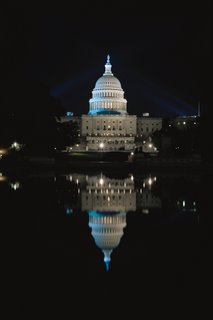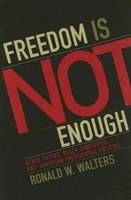why eat hamburger when you can have steak? (part 2)

so saturday, while we were all sitting poolside and drinking pineapple mojitos and 'wynn punch' and, as we would later learn, sunburning ourselves quite significantly, we got into a discussion on government and race, as most dudes at bachelor parties are wont to do. one particular topic we landed on was the lack of diversity in congress--specifically, as stanton offered, how blacks make up around 13% of the US population, but are represented by a significantly smaller fraction of senators: one, to be exact. stanton, as he is wont to do, immediately used this inherently diced condition to advance a radical proposal: that it should be mandatory for the senate to have 13 black senators. he was very obstinate about this point; it didn't matter how the number was achieved. forget all the complications; stanton said he didn't care how these black senators were elected, or whose seats they'd have to usurp; he didn't want to hear whether or not this was at all constitutional, or of any other real obstacles. stanton just wanted the government to reflect the makeup of its citizens.
my first instinct was to agree that something had to be done to bridge this divide. but my second instinct was to play devil's advocate, and i said that first blacks should increase their turnout in elections--then they'd be in a better position to complain about a lack of blacks in the senate. i have long been a proponent of the doctrine: if you didn't vote then, then you can't complain now. (i should say i dont really know how large or small black turnout historically is; i just assumed it was lower than white turnout b/c i have always heard that wealthier and more educated people tend to vote in higher numbers, and i believe that blacks have less wealth and education per capita among them than whites--but obv. that's a whole other discussion.)
anyhoo, upon (non-reluctant) reflection, i have come to realize that my devil's advocacy was way off-base. it really doesn't matter how large black turnout is--that is besides the point. in reality, blacks are no different than any other group of people, in that they care about their future, and accordingly the laws and bills that are passed that will mold that future. so, if they're not voting, and are for the most part not in high levels of gov't--for whatever reason--it's silly to fault them; they must have good reason. they must be thoroughly disallusioned. they must generally think that both parties--republican and democratic alike--are similarly apathetic towards them. i know i see a whopping difference between the two parties--and to me, this includes a large difference between how the two parties treat blacks--but i think i can see how blacks dont see much of a difference. for one thing, both parties are, for the most part, totally whitewashed.
thusly, since i wouldnt fault blacks for any lack of participation, i almost wholly fault the system. the goverment, and society as a whole, has failed to integrate blacks into the government on a level commensurate with the size--and accordingly, needs--of their population. this is just a fact. therefore, i agree with stanton--the system must bend towards accomodating blacks--not the other way around. if a large portion of american citizens dont have a seat at the table, the table must be made larger. it's that simple. the US--and any country that purports to take care of its own, for that matter--should be proactive in getting its citizens invlolved--not passive. and if you want to tell me that, via whatever current programs you think are solid, the government is being proactive with this, i say, open your friggin' eyes. brother, it ain't working.
(i should say: im aware that higher black turnout per se would not nec. mean more black senators, anyway. for one thing, more blacks would need to run for seats. for a second thing, blacks are spread out across the country diffusely enough that even if there was a black candidate for every open seat, there might not be enough of a critical mass of black voters in each individual state to push a candidate over the top, into victory. bear with the post; my proposal will render this point moot.)
(ps--since i orginally wrote this, i did some more digging, and found that national black turnout is actually pretty comparable to white turnout (as stated in the last paragraph here and indicated in this chart). still, that doesn't change how i feel about the 'doctrine' i mention above. ie, both blacks and whites should vote more, but if blacks generally feel more under-represented in gov't, perhaps one could argue that the onus to raise turnout is more on them than whites. to be honest, part of me now wishes i had never raised the turnout issue--it might be a red herring (yes!)--but i dont want to reconfigure this whole bloody thing, and the main point of the post remains classy.)

in the end however, stanton's bottom-line idea is infeasible for at least dozens of intuitive reasons; it could never be put into practice. and even if it was (were?) doable, enforcing stanton's bottom-line mandate in the senate would necessitate so many other systemic changes as to destroy the functionality of the body.
so here's my little donnie of a plan. in order to help correct this imbalance of our gov't, i think we should have a third body in the legislative branch of government.
i would call this body the people. it would number 100 members, each of whom would be called a champion of the people, or champion for short. (champion charles schumer.) the head of the body would be called first champion.
there would be designated seats like in the house and senate, but instead of being assigned to districts and states, they'd be tied to social-ethnic groups, with quanities of seats per group being proportional to their populations, according to some survey, like the census. proposed groups:
whites
blacks
hispanics
native americans
jews
gays
etc.
perhaps the populations would be weighted in some way. for one thing, id like to give a couple of extra seats to native americans, who i dare say have been diced by the US more than any other group. also, maybe jews and whites get combined, for instance; im not gonna pretend jews suffer nearly as much prejudice--and therefore are not shut out of decision-making as much--as blacks, and the point of this is to bring everyone to even ground.
and much as a new yorker can only vote for new york senators, individuals would only be allowed to vote for champions of their particular groups.
yes, this brings up some very tricky complications. stanton is a good case study; he's half black, half white. if he ran, which seat would he occupy? when he votes, which group does he vote for?
im not going to deal with/address these concerns now. clearly some very arbitrary lines would have to be drawn. im willing to accept that for the greater good.
essentially, the function of the people would be much the same as the other two bodies. it would be able to propose bills, and all legislative bills would have to pass a majority (2 out of 3) of the three houses. (this system, requiring a majority rather than unanimous approval, should somewhat cancel out the extra bureaucracy the addition of a third body would create.)
(btw, lest you think this opens the door for the senate and house, if dominated by one party (as they are now), to freeze out the people by automatically aligning with each other on bills, consider this. there are plenty of instances where the house and senate have 'disagreed' on key issues/bills, even when they're controlled by the same party. reps. and senators, ultimately, are beholden to their respective districts/states more than their parties.)
the people would be combined with the senate in approving supreme court nominees. the first champion would be fourth in the line of presidential succession.
obv. this system would be less than ideal. intrinsically, it would not really be a meritocracy, which we'd like to think goverments should be. but the big point here is that our 'ideal' system is not working. we might have to put a less-than-ideal system into place to achieve our ideal conditions. and to me, the ends would justify the means.
lest you think this idea is totally nutty--and maybe it is--think about this. for the most part, the founding fathers invented the current system under the pretense that the common man should never really be involved in high level gov't decisions--look at the cockamamie electoral college. now add this thought to that: when we try to build governments from the ground up, we make sure every group is intrinsically involved. look at iraq--we have learned that we MUST include all three major groups--sunnis, kurds and shiites--else the new gov't is inherently ineffective and generally diced. im not proposing we start from scratch all over again--that would bring more harm than good. im simply proposing we tweak, or augment the system, to reflect what we might do if we did start over. cuz obv. our current don is not working as well as it should. in many ways, our system is genius, but it's ancient too, and it's become a faltering relic in other important ways.
why have a bicameral legislature, when you can have a tricameral one?
oh, i forgot one thing. of course, the people would have to be 50% female.
a note on kobe bryant. there's a lot of debate over whom should be the nba's mvp this season. it's all bull. people just dislike kobe (myself included). so they say he doesn't deserve the honors since he 'doesn't make his teammates better' and 'LA is not one of the top teams.' these are just excuses to justify not voting for someone on account of personal feelings. in reality, the dude's the obv. choice for mvp. if we step back from our visceral dislike of him, it's a no-brainer. really, for anyone who's followed the nba this season, no explanation should be nec.


1 Comments:
ffff
Post a Comment
<< Home